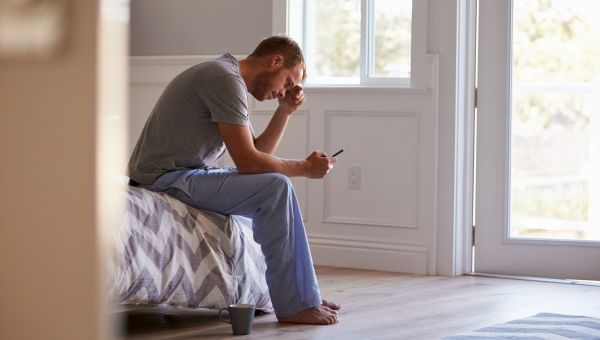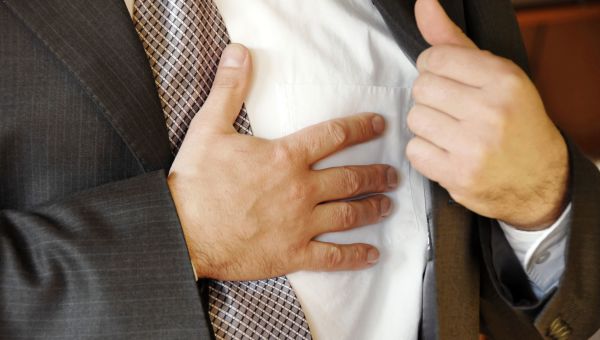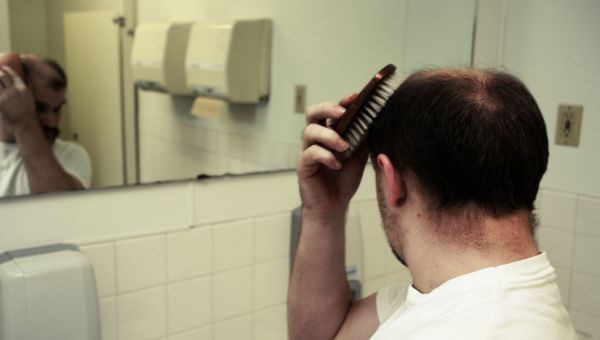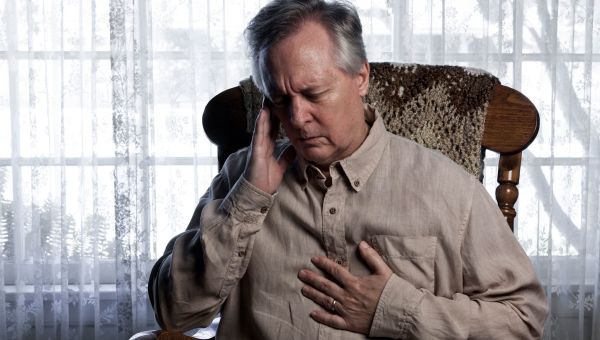7 uncomfortable men’s health questions to ask a provider
Worried that you’re losing hair or muscle, or using the bathroom a lot more? It’s okay to speak up.
Updated on July 30, 2024

Whether it’s stigma, cultural pressure, personal uneasiness, or something else, many men don’t feel comfortable talking about their health when problems arise. They may not want to admit a possible medical issue to their partner, friends, family, or even a healthcare provider (HCP).
But keeping symptoms to yourself could turn a small health problem into a bigger one. And… Show More
Whether it’s stigma, cultural pressure, personal uneasiness, or something else, many men don’t feel comfortable talking about their health when problems arise. They may not want to admit a possible medical issue to their partner, friends, family, or even a healthcare provider (HCP).
But keeping symptoms to yourself could turn a small health problem into a bigger one. And if you don’t speak up, you may be deprived of a treatment that could improve your quality of life.
It’s important to confide in your HCP, even when certain topics may seem awkward or uncomfortable. Here are seven questions you might ask, plus answers that could make a difference in your well-being.
Show Less
Why am i so angry?
Anger is a healthy emotion that we all experience at one time or another. But there are situations where it may point to more serious problem. For example, do you find yourself suddenly losing your temper more easily? Have you begun drinking more lately? What about other dangerous behavior, like… Show More
Anger is a healthy emotion that we all experience at one time or another. But there are situations where it may point to more serious problem. For example, do you find yourself suddenly losing your temper more easily? Have you begun drinking more lately? What about other dangerous behavior, like driving too fast or partying too much? If you answered yes, you could be depressed.
Studies suggest that depression sometimes looks different in men than it does in women. Many men experience hallmark symptoms like apathy, sadness, sleep issues, and fatigue, just as women do. But they may be more likely to have atypical symptoms of anger or aggression, substance abuse, and risk-seeking behavior.
These symptoms often go unrecognized as part of depression. But it’s important to reach out to an HCP if you experience them, especially if they’re out of the ordinary for you.
Show Less
why is my penis curved?
If your erection is curved it could be a sign of Peyronie’s disease. It usually stems from an injury to the penis, possibly from sex, sports, or an accident. That damages blood vessels, which leads to swelling inside the penis and blocks blood flow. Then, scar tissue forms, which causes the penis… Show More
If your erection is curved it could be a sign of Peyronie’s disease. It usually stems from an injury to the penis, possibly from sex, sports, or an accident. That damages blood vessels, which leads to swelling inside the penis and blocks blood flow. Then, scar tissue forms, which causes the penis to curve, or bend, when it becomes erect. A sharp-enough bend can make sex painful, or even impossible.
If you’re sure you haven’t sustained an injury but your penis is still curved, the underlying cause may be an autoimmune disease. A 2015 study of more than 1,100 men suggests that men with Peyronie’s disease have a higher rate of autoimmune disease than men without the condition. Researchers think an autoimmune disease may be attacking cells in the penis, leading to the scarring that causes the penis to bend.
Show Less
what's this lump on my pec?
Thanks to awareness efforts, many people understand that a lump in a woman’s breast can be a sign of breast cancer. But people may not know that it’s also a potential sign of breast cancer in men.
According to the American Cancer Society, about 1 in 726 men can also expect to have breast… Show More
Thanks to awareness efforts, many people understand that a lump in a woman’s breast can be a sign of breast cancer. But people may not know that it’s also a potential sign of breast cancer in men.
According to the American Cancer Society, about 1 in 726 men can also expect to have breast cancer in their lifetimes. One possible sign is a lump. Other signs include:
- Nipple discharge
- Skin puckering
- Redness or scaling around the nipple
Age, a family history of breast cancer, obesity, and heavy alcohol use are among the risk factors for men to develop breast cancer.
Another possible change to men’s breasts is gynecomastia, a condition in which men grow enlarged breast tissue. The excess tissue usually appears under the nipples. Low testosterone, an overactive thyroid, and liver disease could be causes, as can certain medications and drugs like anabolic steroids and marijuana.
About one in four men between the ages of 50 to 70—especially those who are overweight—develop gynecomastia due to normal hormonal changes. Stopping the medication or drug that’s causing the tissue growth usually takes care of it, although other causes of gynecomastia may exist, requiring treatment.
Show Less
What can I do about my hair loss?
Going bald may not be dangerous to your health, but it can deal a blow to your self-confidence. Hair loss can trigger feelings of disfigurement and even depression and anxiety. It’s why some men to seek ways to slow or reverse their hair loss.
Two of the most common medication treatments for hair… Show More
Going bald may not be dangerous to your health, but it can deal a blow to your self-confidence. Hair loss can trigger feelings of disfigurement and even depression and anxiety. It’s why some men to seek ways to slow or reverse their hair loss.
Two of the most common medication treatments for hair loss are minoxidil and finasteride. Minoxidil is an over-the-counter liquid you massage into the scalp to potentially slow hair loss or regrow hair. Side effects include scalp irritation, hair growth on the face and hands, and rapid heartbeat.
Finasteride is a daily pill to slow hair loss and sometimes regrow hair. Side effects include a lower sex drive, problems performing sexually, and an increased risk of prostate cancer.
Surgery can also be effective, and it is sometimes used together with medication. Surgeons take sections of scalp with hair follicles, called plugs, and attach them to bald spots. Infection and scarring are possible side effects.
Show Less
why do i pee way more than i used to?
If you can’t go far without a trip to the bathroom, you’re not alone. As men grow older—especially after age 50—many develop a condition called benign prostatic hyperplasia, also known as an enlarged prostate. The prostate is a walnut-shaped gland near your bladder that produces one of the elements… Show More
If you can’t go far without a trip to the bathroom, you’re not alone. As men grow older—especially after age 50—many develop a condition called benign prostatic hyperplasia, also known as an enlarged prostate. The prostate is a walnut-shaped gland near your bladder that produces one of the elements of semen.
Researchers aren’t sure why the prostate grows as men age. But when it does, it can block urine flow, making it harder for the bladder to push urine out. That makes the bladder walls thicker so that it can’t hold as much urine, which causes you to pee more often.
Symptoms of an enlarged prostate can include:
- Urinating eight or more times a day
- Frequent nighttime urination
- Dribbling
- Incontinence
- Urinary hesitancy, which is trouble starting urination
- A weak urine stream
Benign prostatic hyperplasia can lead to urinary tract infections and bladder or kidney damage. Medications and surgery can shrink the prostate, but lifestyle changes can also help reduce the need to pee. These include:
- Limiting caffeine and alcohol
- Watching your fluid intake
- Exercising your pelvic floor muscles

why can't i lift weights like i used to?
As you get older, you may find you bench less than before. This is commonly due to sarcopenia, or age-related muscle loss. Between ages 30 and 70, most men can expect to lose between 3 and 5 percent (or more) of their muscle mass per decade. At 70, muscle loss accelerates. It all adds up to about… Show More
As you get older, you may find you bench less than before. This is commonly due to sarcopenia, or age-related muscle loss. Between ages 30 and 70, most men can expect to lose between 3 and 5 percent (or more) of their muscle mass per decade. At 70, muscle loss accelerates. It all adds up to about 30 percent of muscle lost in a lifetime.
Sarcopenia may be caused in part by the decline in testosterone men experience as they age. You can slow your muscle loss by eating enough protein and continuing with resistance training. It’s important to know your limits, however. Speak with an HCP about how your regimen should change over time, or if your current routine becomes painful.
Show Less
My chest hurts; is it just a bad case of heartburn?
Don’t let chest pain go unchecked. It can be the sign of a serious condition that should be treated out without delay. These conditions include:
- A heart attack
- Blood clot in the lungs (pulmonary embolism)
- Inflammation of the heart (pericarditis)
- Disease of the heart muscle
- A lung infection
- A panic … Show More
Don’t let chest pain go unchecked. It can be the sign of a serious condition that should be treated out without delay. These conditions include:
- A heart attack
- Blood clot in the lungs (pulmonary embolism)
- Inflammation of the heart (pericarditis)
- Disease of the heart muscle
- A lung infection
- A panic attack
- An artery tear
Chest pain may also indicate angina, a symptom of coronary heart disease. There are two types: stable angina and unstable angina.
Stable angina (also called angina pectoris) feels like a pressure, squeezing pain in the chest which comes about when you’re engaged in physical activity (climbing stairs, raking leaves) or feeling strong emotions, like stress. It happens when an artery is blocked, reducing blood flow, and usually lasts for a few minutes.
Unstable angina is the far more serious kind which usually comes on suddenly when you’re sleeping, resting, or exerting little effort. It’s a symptom of atherosclerosis, a condition where a fat-like substance builds up in the blood vessels. These can rupture and create clots, reducing blood flow to the heart.
If you experience either of these kinds of chest pain, stop what you're doing and go to the emergency room. It requires immediate medical attention. You should also seek attention for:
- Gastroesophageal reflux
- Upper stomach pain, or pain located in the upper half of the abdomen
- Pain in the mid to upper back
- Burning pain in the chest (versus the more typical stabbing, pressure or squeezing pain)
Chest pain can also be caused by something less serious, such as a pulled muscle. But it’s better to be safe than sorry. Call 911 right away if your chest hurts.
Show Less
Mayo Clinic. Depression (major depressive disorder). October 14, 2022.
Martin LA, Neighbors HW, Griffith DM. The Experience of Symptoms of Depression in Men vs Women: Analysis of the National Comorbidity Survey Replication. JAMA Psychiatry. 2013;70(10):1100–1106.
Mayo Clinic. Male depression: Understanding the issues. February 13, 2024.
NIH: National Institute of Mental Health. Depression. Reviewed March 2024.
NIH: National Institute of Diabetes and Digestive and Kidney Diseases. Penile Curvature (Peyronie’s Disease). Reviewed August 2019.
American Cancer Society. Key Statistics in Breast Cancer for Men. Revised January 18, 2024.
American Cancer Society. Signs and Symptoms of Breast Cancer in Men. Last revised April 27, 2018.
American Cancer Society. Risk Factors for Breast Cancer in Men. Last revised April 27, 2018.
FamilyDoctor.org. Gynecomastia. Updated August 2022.
Mayo Clinic. Enlarged breasts in men (gynecomastia). October 26, 2023.
Mayo Clinic. Hair loss. January 19, 2024.
NIH: National Institute of Diabetes and Digestive and Kidney Diseases. Prostate Enlargement (Benign Prostatic Hyperplasia). Reviewed September 2014.
Mayo Clinic. Benign prostatic hyperplasia (BPH). March 1, 2024.
Harvard Health Publishing. Preserve your muscle mass. February 19, 2016.
Kim TN, Choi KM. Sarcopenia: definition, epidemiology, and pathophysiology. J Bone Metab. 2013 May;20(1):1-10.
NIH: National Heart, Lung, and Blood Institute. Angina (chest pain): Causes and Risk Factors. Updated July 10, 2023.
American Heart Association. Angina (Chest Pain). Reviewed November 8, 2021.
More On


video

article

slideshow


video


video
